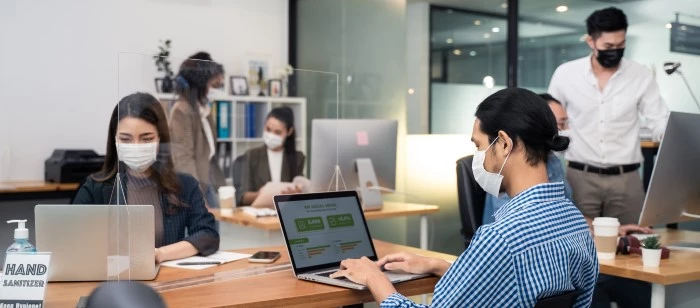
Member Article
New research shows effect of air purification in office spaces
Offices around the country are being told there may not be a need to reinstate work from home mandates this winter, as studies continue to show effectiveness of indoor air purification devices for keeping COVID-19 at bay.
According to the Chartered Management Institute, almost half of UK staff have returned to the office at least on a part-time basis but managers expect numbers to plateau given continued worries over the spread of Covid-19 and the shift to flexible working practices amid winter weather.
However, according to UK business Pathogen Solutions, studies are continuing to show that indoor air purification devices, which can be quickly and easily installed in offices nationwide, are demonstrating high effectiveness when it comes to removing coronavirus particles in the air.
The company’s managing director, John Burrows, points to a recent study from Addenbrookes Hospital in Cambridge. He explained: “The benefits of air purification in preventing airborne spread of SARS-CoV-2 has been studied for some time now, in education and medical settings, with positive results. The most recent, a study from Addenbrookes Hospital in Cambridge, generated first class data which demonstrates the efficacy of air purification in reducing the spread of covid within indoor environments.”
To determine how air purifiers stand up to real-world conditions, study co-author Vilas Navapurkar, an intensive-care unit (ICU) physician at the hospital, installed air purification devices in two fully occupied COVID-19 wards — a general ward and an ICU. The team chose high-efficiency particulate air (HEPA) filters, which draw air through a fine mesh to capture extremely small particles known as aerosols. Air samples were collected from the wards during a week when the air filters were switched on and two weeks when they were turned off.
In the general ward, the results showed that SARS-CoV-2 could be detected in the air when the filter was off, but not when it was on. In the ICU ward, very few airborne particles were detected, even when the filter was turned off. This could be because the virus replicates more slowly at later stages. In any case, the study could mark a major breakthrough in determining the efficacy of such filters within indoor environments.
John Burrows, of Pathogen Solutions, which manufactures the ultra-violet air steriliser Medixair, continued. He said: “For a long-time experts and scientists have been debating the effectiveness of air purification devices when it comes to reducing the spread of SARS-CoV-2 and eliminating particles in the air. However, Addenbrookes is not the only study that shows a marked difference. Researchers at the University of Milan identified the effectiveness of UV-C light against SARS-Cov-2 (the current strain causing the pandemic). The study, published in Nature in March 2021, discovered that a device with the power of Medixair (20mJ/cm2) would deliver complete inactivation of the virus.
“It is becoming clearer that all the research carried out into air purification demonstrates a positive effect on reducing airborne transmission of pathogens. As the country continues to learn to live with coronavirus, the installation of air purification devices within indoor settings can significantly reduce risk. This gives offices hope they can continue to open safely for employees even as the winter kicks in and covid rates inevitably increase.”
Medixair has been scientifically proven when deployed within confined indoor settings, especially those with poor ventilation and high room temperatures during winter months. This includes a wide range of environments such as offices, classrooms and even in domestic settings such as homes and care homes. The 110W unit employs high-intensity ultraviolet light to decontaminate the air within indoor environments. The machine is portable, plug and play and works by drawing air into the unit and exposing it to UV light which is a proven method for killing bugs. The clean disinfected air is then re-circulated back into the room. This method kills the pathogen in the air, preventing transmission, rather than redirecting it outdoors.
Burrows added: “Demand for Medixair globally, and particularly across Europe, remains high. All our units are manufactured in the UK and require simple installation. The design is based on well proven technology and backed by thorough research. In fact, back in the 1980s researchers found that UV lamps were effective in preventing transmission of a wide range of harmful organisms including tuberculosis, MRSA and norovirus and the technology is now being recommended for use in combatting coronavirus.”
This was posted in Bdaily's Members' News section by Pathogen Solutions .




 test article 123456789
test article 123456789
 hmcmh89cg45mh98-cg45hm89-
hmcmh89cg45mh98-cg45hm89-
 test456456456456456456
test456456456456456456
 test123123123123123123
test123123123123123123
 test xxxdiosphfjpodskhfiuodsh
test xxxdiosphfjpodskhfiuodsh
 Savour the flavour: North Tyneside Restaurant Week returns for 2024
Savour the flavour: North Tyneside Restaurant Week returns for 2024
 Six steps to finding the right buyer for your business
Six steps to finding the right buyer for your business
 Stephen signs off on a special night
Stephen signs off on a special night
 Life’s a Peachaus: Gillian Ridley Whittle
Life’s a Peachaus: Gillian Ridley Whittle
 Making a splash: Phil Groom
Making a splash: Phil Groom
 Making workplace wellbeing a priority
Making workplace wellbeing a priority
 A record of delivery, a promise of more: Ben Houchen
A record of delivery, a promise of more: Ben Houchen